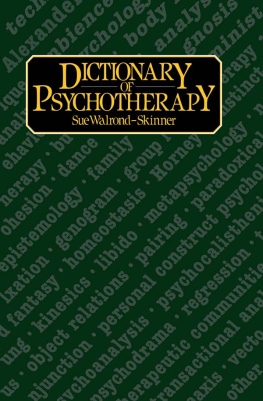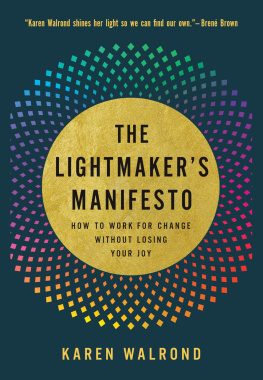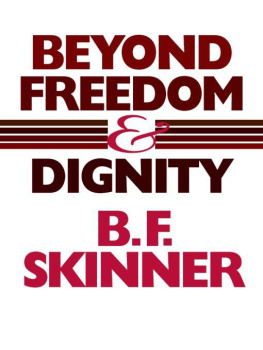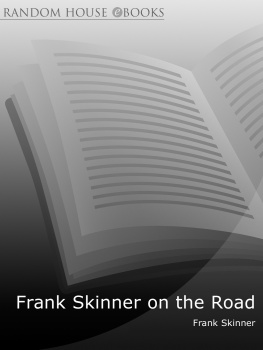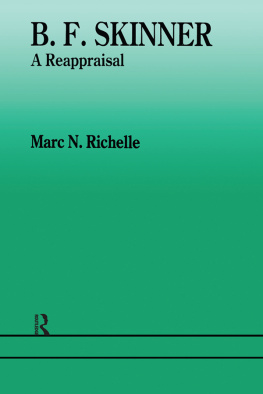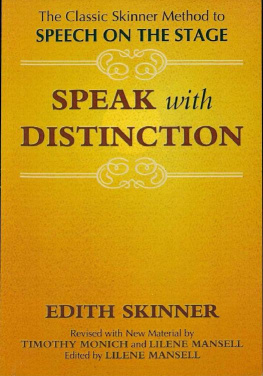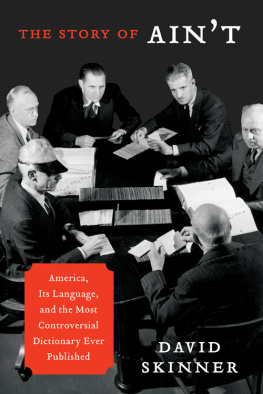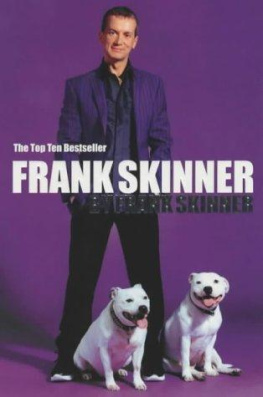Walrond-Skinner - A dictionary of psychotherapy
Here you can read online Walrond-Skinner - A dictionary of psychotherapy full text of the book (entire story) in english for free. Download pdf and epub, get meaning, cover and reviews about this ebook. year: 2014, publisher: Taylor and Francis;Routledge, genre: Home and family. Description of the work, (preface) as well as reviews are available. Best literature library LitArk.com created for fans of good reading and offers a wide selection of genres:
Romance novel
Science fiction
Adventure
Detective
Science
History
Home and family
Prose
Art
Politics
Computer
Non-fiction
Religion
Business
Children
Humor
Choose a favorite category and find really read worthwhile books. Enjoy immersion in the world of imagination, feel the emotions of the characters or learn something new for yourself, make an fascinating discovery.
- Book:A dictionary of psychotherapy
- Author:
- Publisher:Taylor and Francis;Routledge
- Genre:
- Year:2014
- Rating:3 / 5
- Favourites:Add to favourites
- Your mark:
- 60
- 1
- 2
- 3
- 4
- 5
A dictionary of psychotherapy: summary, description and annotation
We offer to read an annotation, description, summary or preface (depends on what the author of the book "A dictionary of psychotherapy" wrote himself). If you haven't found the necessary information about the book — write in the comments, we will try to find it.
A dictionary of psychotherapy — read online for free the complete book (whole text) full work
Below is the text of the book, divided by pages. System saving the place of the last page read, allows you to conveniently read the book "A dictionary of psychotherapy" online for free, without having to search again every time where you left off. Put a bookmark, and you can go to the page where you finished reading at any time.
Font size:
Interval:
Bookmark:
_____ A _____
DICTIONARY
_______ OF _______
PSYCHOTHERAPY
_____ A _____
DICTIONARY
_______ OF _______
PSYCHOTHERAPY
Sue Walrond-Skinner

FOR DOROTHY LANGDALE-SMITH
who knows a lot about all this
Part of the proceeds from the sale of this book are
dedicated to those many people of the developing
world for whom daily living is a battle for physical
survival and for whom psychotherapy of any kind is
an irrelevant luxury.
First published in 1986
by Routledge & Kegan Paul plc
Published 2013 by Routledge
2 Park Square, Milton Park, Abingdon, Oxon OX14 4RN
711 Third Avenue, New York, NY 10017, USA
Routledge is an imprint of the Taylor & Francis Group, an informa business
Set in Ehrhardt
by Columns, Reading
Sue Walrond-Skinner 1986
No part of this book may be reproduced in
any form without permission from the publisher,
except for the quotation of brief passages
in criticism
Library of Congress Cataloging in Publication Data
Walrond-Skinner, Sue.
A dictionary of psychotherapy.
Includes bibliographies.
1. Psychotherapy Dictionaries. I. Title.
[DNLM: 1. Psychotherapy encyclopedias. WM 13 W221d]
RC475.7.W35 1986 616.89140321 85-28267
British Library CIP data also available
ISBN 978-0-7100-9978-5 ISBN 978-0-710-09978-5 (hbk)
Publisher's Note
The publisher has gone to great lengths to ensure the quality of this reprint but points out that some imperfections in the original may be apparent.
S. Lesse's (1981) editorial to the 35th edition of the American Journal of Psychotherapy (no. 4) produced some interesting figures regarding the information explosion of the twentieth century. He remarked that there are now more than 62,000 scientific journals in existence so that anyone who attempts research into even a highly limited field of enquiry one aspect of psychotherapy for example must scan hundreds of thousands of articles to obtain a reliable overview of the given field. In terms of human resources time, effort and endurance the task becomes one of mind-boggling proportions. We are faced with the relentless fact that the total volume of available printed information in the world now doubles every ten years and by the year 2000 it is likely to double in just one year.
In the field of psychotherapy there are now literally thousands of journals in existence, each producing articles several times a year, whilst the number of books produced in each sub-specialty of the field every year runs into many hundred. This dictionary can therefore only be classed as a modest offering within an already burgeoning growth area of encyclopaedia, compendia and word books, all attempting to bring some order to the field and offer some maps to guide the serious student of psychotherapy over a rough and uneven terrain. Its raison d'tre stems from the rapidity with which our field has developed within the last ten years, making many excellent word books and dictionaries already out of date. Not only have a bewildering array of new therapies come on to the scene (since, for example, H.J. Eysenck's Dictionary of Psychology was published in 1972), but the usage of terms shifts subtly in the older psychotherapies as they are influenced by and seek to influence, in an implicit two-way dialectic, the changing social, political and intellectual context in which they are embedded. The private, specialised language of our profession grows and develops with a life of its own and new entrants need to be acquainted with the current usage of its terminology as well as the vertical connections with history and the lateral connections with terms currently used across the different areas of psychotherapy. It is mainly for these that this dictionary has been prepared but I hope too that experienced practitioners who specialise in one or two forms of treatment will be intrigued and enlightened, as I have been, with the different understanding that can be gained from considering how the same technique or concept is used by theorists and practitioners from a range of different approaches.
Many problems surround the compilation of this sort of book. Selection is the obvious first and I have no doubt been biased unconsciously in what I have chosen to include and what I have left out. Consciously I have wanted to ensure the inclusion of many new ideas, forms and interventions that do not figure in older dictionaries. This means that less space has been devoted to classical concepts from the behavioural and psychoanalytic approaches. In any case, I would expect there to be less need to be comprehensive in these areas although I have tried to be representative. I have wanted to include the most important aspects of behavioural and psychoanalytic theory and practice and whilst relying heavily on secondary material, I have returned as often as possible to the original sources and to the classic texts, new and old, in order to gain as accurate a picture as possible of the current use of the term. I have tried to refer to journal articles on each subject area published during the last five years as well as to primary source material, beginning in most cases with the original writer's early work.
This brings me to another problem. Terms are used differently and often polemically by different theorists and practitioners. Many definitions may be held of the same term so how does one arrive at a statement which embodies its crucial meaning, without boiling down areas of difference into a false consensus? Commenting in 1958 on this problem in the preface to his Comprehensive Dictionary of Psychological and Psychoanalytical Terms, Horace English wrote: A particular art is required to phrase a definition that will represent, not just a single author's meaning, but the centre of gravity of a whole cluster of individual meanings. I have sought to deal with this problem by treating the work more as an encyclopedia and less as a dictionary in the strict sense. Thus, although I do in the main attempt a definition for each term, I have tried to elaborate, in an article of varying length, on the different usages made of the concept. I have provided a short bibliography for most items, to guide the reader towards the most recent specialist texts which will help him or her to study the concept more fully. Where a topic is discussed by many different writers from widely different perspectives, I have used just a few examples from the method literature with which I have been most familiar or which has been most easily accessible to me.
Any book is a temptation to fly one's own idiosyncratic kites; to shape and bend the ideas of others to conform to one's own predilections. I have tried to avoid these pitfalls though undoubtedly not altogether successfully. I have, I admit, censored some types of interventions which I have stumbled across during the course of my researches, if they have seemed very short on supporting authorities other than their inventor's enthusiasm, but I have included a range of ideas which practitioners from the more orthodox and long-established areas of the field are likely to find bizarre, distasteful or unprofessional. Here I fall back on a lexicographical rationalisation and claim that it is the dictionary compiler's duty to include what is in existence rather than only what ought to be!
I considered calling the book a Dictionary of the Psychotherapies in the hope of bypassing the many wrangles about what does and what does not constitute psychotherapy. But mixedness and muddle is part of the core identity of psychotherapy in the mid-1980s and psychotherapy should be regarded and rejoiced in as a plural noun rather than excused and tidied up. No doubt many will take issue with me as to what I have included and what I have left out. Purists would probably feel that this is a word book about
Next pageFont size:
Interval:
Bookmark:
Similar books «A dictionary of psychotherapy»
Look at similar books to A dictionary of psychotherapy. We have selected literature similar in name and meaning in the hope of providing readers with more options to find new, interesting, not yet read works.
Discussion, reviews of the book A dictionary of psychotherapy and just readers' own opinions. Leave your comments, write what you think about the work, its meaning or the main characters. Specify what exactly you liked and what you didn't like, and why you think so.

